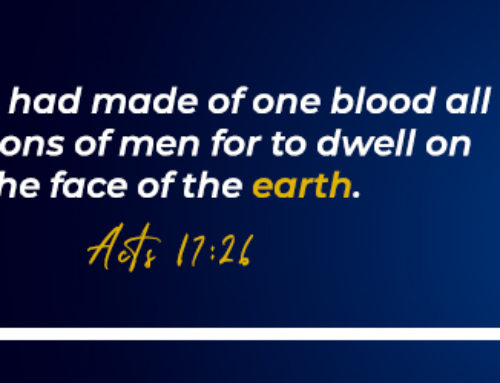And this is exactly what we have in Christendom today. Rather than the Story of Redemption, with Jesus’ sacrifice as the foundation, being preached, church attendees are served with a plethora of what the Apostle Paul calls another Gospel (Galatians 1:8). In the place of proclaiming man’s sinful nature and his need for a Savior, they are told how good they are and how better they can become by following the latest 5 point strategy to success. Congregants are fed with a dazzling dose of intellectual philosophy by charismatic, motivational speakers whose purpose is to entertain rather than lift up Jesus of Nazareth, the only Savior of the world. Replacing the word of God is mystical meditations designed to bring the people into ‘closer touch’ with God. Worldly entertainment mixed with feel-good theology has supplanted the precious Hymns of Zion under the cover of ‘Praise and Worship’. Faith in the Bible is almost totally eradicated. Simple faith in God’s word is no longer encouraged.
Despite all this, we can and must trust the Bible as God’s inspired word and have faith in it. A converted Peter educates us, “We have also a more sure word of prophecy; whereunto ye do well that ye take heed, as unto a light that shineth in a dark place, until the day dawn, and the day star arise in your hearts: Knowing this first, that no prophecy of the scripture is of any private interpretation. For the prophecy came not in old time by the will of man: but holy men of God spake as they were moved by the Holy Ghost” (2 Peter 1:19,20).The Apostle Paul, in like fashion, teaches us, “For whatsoever things were written aforetime were written for our learning, that we through patience and comfort of the scriptures might have hope” (Romans 15:4). He continues: “So then faith cometh by hearing, and hearing by the word of God”(Romans 10:17)
What is this thing called faith, anyway? Do we really understand what it means? The apostle Paul gives us the classical definition: “Now faith is the substance of things hoped for, the evidence of things not seen” (Hebrews 11:1). Plainly stated, faith means trusting and believing in that which you cannot experience with the natural senses. Faith is a spiritual concept that emanates from an infinite God to finite man. From a Biblical perspective, faith is trusting God that He will bring to pass in your life that which He has promised and what is best for your salvation. Faith demands believing in all that God has revealed in His word, the holy Bible, about Himself. Thus Paul explains: “But without faith, it is impossible to please God: for he that cometh to God must believe that He is, and that He is a rewarder of them that diligently seek Him” (Hebrews 11:6).
These are the very first words of the Bible: “In the beginning, God created the heaven and the earth” (Genesis 1:1). Do you believe those words? If you do, then you must believe everything else that follows. Since none of us were there when God created the world or were eye witness to the mighty epochs of Scripture, then it stands to reason that it is only by faith we can believe, not only the creation story; but the Bible as a whole. Those first words of the Bible demand unquestioning faith in God. He gave us no preamble. No theological exegesis is put forth. No intellectual philosophy is engaged in. God simply, but quite assuredly and unapologetically, declared “God Created” To believe the Bible requires unequivocal faith.
Contrary to popular belief, particularly among some Christian circles, faith is not mind power. It is not the ability to visualize ones personal desires, and through the power of the mind, bring them to pass. Such a concept, though appealing to the carnal nature, is false and dangerous. Faith is not ‘name it and claim it’. Rather, it is trusting God that whatever He allows to come to pass in your life is for your good. Paul again admonishes us: “And we know that all things work together for good to them that love God, to them that are the called according to His purposes” (Romans 8:28).
The patriarch Abraham understood clearly the nature of faith. When called upon by God to leave his kinsfolk and go to a place wither he knew not, Abraham willingly obeyed. When told by God that he would have a child in his old age, though he did not believe initially; Abraham finally trusted God to bring to pass in his life that which God had promised. Later, when asked by God to sacrifice that very son of his old age that God had promised and fulfilled, Abraham, without any hesitation, obeyed. The patriarch Job, in like fashion, demonstrated his faith in God when, deprived of all his earthly possessions, including his health, declared: “Though He slay me, yet will I trust in Him” (Job 12:15).
There is no book like the Bible and there is no greater weapon in the Christian’s arsenal than faith. We are saved by faith, as we believe and trust in the word of God. We ought to live by faith in the word of God. We will finally be delivered by faith, as we are strengthened by our belief in the word of God. For only those, who through faith, fortify their minds with the truths of the Bible, will find the grace to overcome the trials of today and obtain the strength to withstand the tests and crises of tomorrow.
Princes and popes have banned and burned it, but the Bible still exists. Atheists have denied and abused it, but the word of God still remains. Men have questioned it, but the message of salvation is more pervasive today than ever before in human history. Martyrs were burned, boiled, stoned, sawn asunder, and imprisoned for it; but faith in God and belief in the Bible which reveals God, looms ever stronger. One Protestant Reformer referred to the Bible as the anvil that has worn out many hammers. The Gospel prophet, Isaiah, declares: “The grass withereth, the flower fadeth: but the word of our God shall stand forever” (Isaiah 40:8). The apostle John sums it up thus: “Here is the patience of the Saints: here are they that keep the commandment of God, and the faith of Jesus” (Revelation 14:12).
We have this observation from a prominent Bible scholar, “The central theme of the Bible, the theme about which every other in the whole book clusters, is the redemption plan, the restoration in the human soul of the image of God. From the first intimation of hope in the sentence pronounced in Eden to that last glorious promise of the Revelation, “They shall see His face; and His name shall be in their foreheads” (Revelation 22:4), the burden of every book and every passage of the Bible is the unfolding of this wondrous theme,—man’s uplifting,—the power of God, “which giveth us the victory through our Lord Jesus Christ.” 1 Corinthians 15:57).
He who grasps this thought has before him an infinite field for study. He has the key that will unlock to him the whole treasure house of God’s word. The science of redemption is the science of all sciences; the science that is the study of the angels and of all the intelligences of the unfallen worlds; the science that engages the attention of our Lord and Saviour; the science that enters into the purpose brooded in the mind of the Infinite—“kept in silence through times eternal” (Romans 16:25, R.V.); the science that will be the study of God’s redeemed throughout endless ages. This is the highest study in which it is possible for man to engage. As no other study can, it will quicken the mind and uplift the soul” (Education, E. G. White pg. 125-126).
The Bible is the only bulwark and singular guard against the devil’s delusions that are rampant in the church and in the world. Faith in it gives power to sustain and hope to strengthen. It is indeed that something we can trust in the face of all the perplexing problems that confront the human family. It is the only sure foundation. We can have faith in the Bible.










Leave A Comment